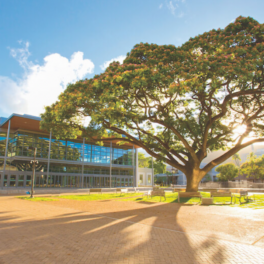Ocean carbon study selected as NOAA 2021 Outstanding Paper
 A CDT (Conductivity, Depth, and Temperature) rosette is lowered into the ocean at Station ALOHA. Credit: HOT Program.
A CDT (Conductivity, Depth, and Temperature) rosette is lowered into the ocean at Station ALOHA. Credit: HOT Program.As carbon dioxide emissions have increased in the atmosphere, the ocean has absorbed a greater amount of carbon according to a publication co-authored by University of Hawaiʻi at Mānoa oceanography Professor Christopher Sabine and selected as a 2021 Outstanding Scientific Paper by NOAA’s Oceanic and Atmospheric Research.
The study, published in Science, reported that the world’s oceans absorbed 34 billion metric tons of carbon from human activity between 1994 and 2007—a four-fold increase to 2.6 billion metric tons per year when compared to the average uptake for the period starting from the Industrial Revolution in 1800 to 1994.
Despite this increase, the percentage of emissions — about 31 percent — absorbed by the ocean has remained relatively stable when compared to the first survey of carbon in the global ocean published by Sabine and co-authors in 2004.
“The uptake and storage in the ocean of human produced carbon dioxide has significantly decreased the climate change effects the planet has seen so far,” said Sabine. “Getting a handle on how much more the ocean can take before marine ecosystems are severely compromised is critical for predicting future climate change impacts.”
By absorbing carbon dioxide from the atmosphere, the ocean reduces the warming impact these emissions would have had if the carbon dioxide had remained in the atmosphere. However, carbon dissolved into the ocean causes seawater to acidify, threatening the ability of shellfish and corals to build their skeletons, and affecting the health of other fish and marine species — many that are important to Hawaiian coastal economies and food security.
Sabine’s publication and the two others selected in Weather and Climate categories, were chosen as exemplary scientific endeavors that showcase the effective collaboration of federal, contractor and cooperative institute scientists to produce research that is vital in advancing NOAA’s mission to better understand our natural world and help protect its precious resources.
All are welcome to join the virtual recognition ceremony and lightning talks for the 2021 OAR Outstanding Scientific Papers on Monday, March 14, 2022, from 12:30-1:30 pm ET. Register to attend: https://attendee.gotowebinar.com/register/3929125014500944911




